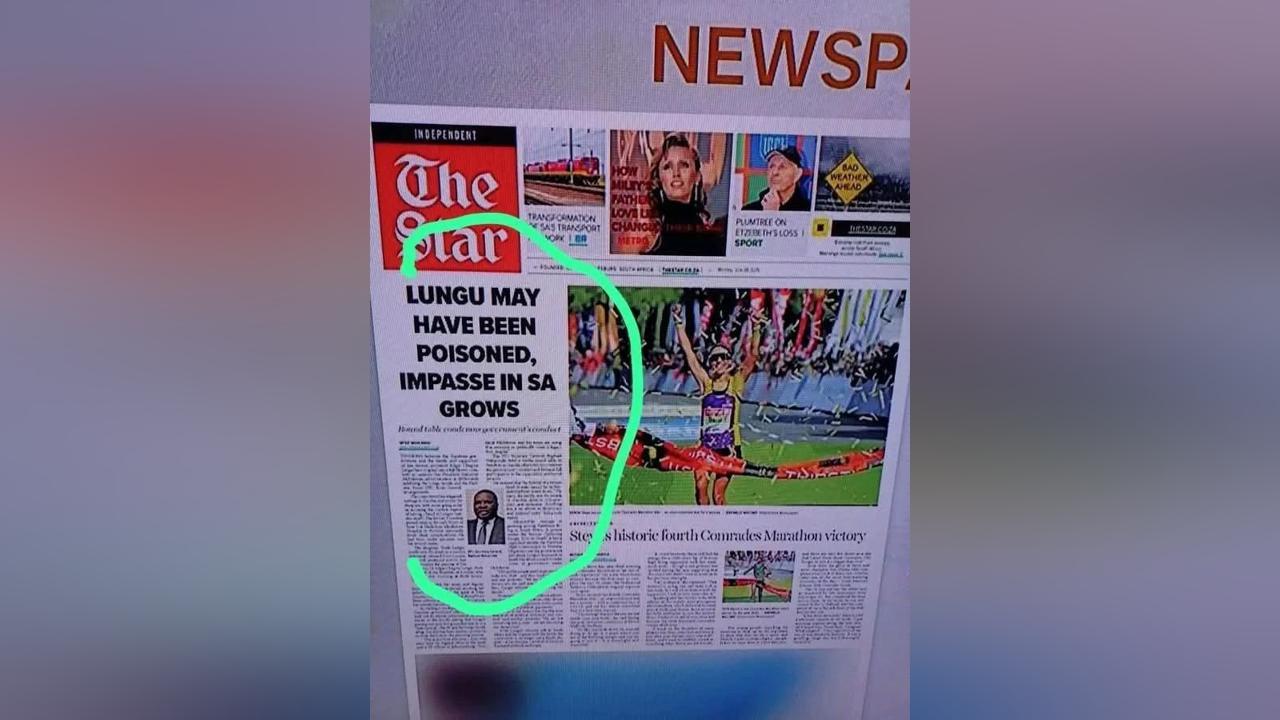Africa-Press – Zambia. Nakachinda is basically accusing the South African government of poisoning Lungu.
The article below has been published in South Africa’s biggest daily newspaper: the Star.
Former Zambian President Edgar Chagwa Lungu has died at the age of 68, with his final days clouded by political tension, medical struggles, and serious allegations of state-sponsored persecution.
Lungu passed away on Thursday in a South African hospital, where he had been receiving treatment for an undisclosed illness.
However, the official silence on the cause of death and mounting accusations from his political allies have sparked a storm of controversy, including claims that the former head of state may have been poisoned to prevent him from contesting the 2026 presidential elections.
Lungu, who served as Zambia’s sixth president from 2015 to 2021, had announced a political comeback in late 2023 after years of relative quiet following his electoral defeat to current President Hakainde Hichilema (popularly known as HH).
But what began as a bid to return to the ballot box quickly turned into a contentious and, some claim, dangerous standoff with the ruling administration.
A Contested Comeback
Lungu’s return to politics was met with immediate resistance from the Hichilema-led government.
In December 2024, the Constitutional Court ruled that Lungu was ineligible to contest again, arguing that his first, partial term from 2015 to 2016 counted as a full term under Zambia’s constitutional two-term limit.
Lungu’s legal team and supporters decried the judgment as politically motivated, pointing to his widespread popularity among grassroots voters and within opposition coalitions as a threat to the ruling United Party for National Development (UPND).
But critics say the court ruling was just the beginning of a broader campaign to shut Lungu out of national politics.
Stripped of Protection and Benefits
Soon after his political re-entry, Lungu was stripped of all retirement benefits typically afforded to former heads of state.
These included state-provided security, official transportation, medical support, and diplomatic privileges. The government justified the move by citing a legal provision that bars retired presidents from engaging in politics if they wish to retain those benefits.
While technically legal, the action had far-reaching consequences for Lungu’s safety and well-being. Without state protection, his movements were left exposed.
More alarmingly, his access to healthcare, particularly urgent specialist treatment, was severely limited. Sources within the Patriotic Front (PF), Lungu’s party, say repeated requests for travel permits to receive medical care abroad were delayed or denied.“He was denied not only political freedom but medical care too,” said a senior PF official.
“When it became clear that he needed to leave for urgent treatment, the government stalled. That decision may have cost him his life.”
Allegations of Poisoning
With the cause of Lungu’s death yet to be officially confirmed, speculation is growing that he may have been deliberately poisoned. Though no forensic evidence has been made public, the PF is calling for an independent international investigation into the circumstances surrounding his death.
His daughter, Tasila Lungu-Mwansa, confirmed in a public statement that her father had been unwell for weeks and had travelled to South Africa under medical supervision. However, she also alluded to the family’s belief that his condition may have been the result of “external interference” — a veiled reference to suspected foul play.
PF leaders have taken a more direct stance. “This was not a natural death,” said Brian Mundubile, a close ally of Lungu. “We believe this was orchestrated to eliminate him politically and permanently.”
Restricted Movement and Surveillance
Beyond the courtroom and hospital bed, Lungu’s daily life was increasingly policed. Police were reportedly stationed outside his home, monitoring his activities and restricting public engagements.
Even routine morning jogs and Sunday church services were flagged as political activity and discouraged or blocked by law enforcement.“It was humiliation, plain and simple,” said one family confidant. “He was a former president being treated like a common criminal just for exercising and praying.”
Human rights activists and opposition figures have condemned the government’s treatment of Lungu as not only unconstitutional but dangerous for Zambia’s democratic fabric. “What happened to President Lungu sets a dangerous precedent,” said a representative of the Zambia Human Rights Commission.
“If a former president can be silenced this way, what protection exists for the ordinary citizen?”
For More News And Analysis About Zambia Follow Africa-Press







